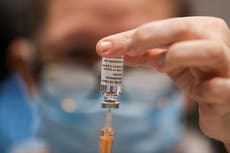Covid: 20,000 people a day ignoring instructions to self-isolate, MPs told
This is ‘a huge number of people every single day who could be passing on the virus,’ says former health secretary Jeremy Hunt
Your support helps us to tell the story
From reproductive rights to climate change to Big Tech, The Independent is on the ground when the story is developing. Whether it's investigating the financials of Elon Musk's pro-Trump PAC or producing our latest documentary, 'The A Word', which shines a light on the American women fighting for reproductive rights, we know how important it is to parse out the facts from the messaging.
At such a critical moment in US history, we need reporters on the ground. Your donation allows us to keep sending journalists to speak to both sides of the story.
The Independent is trusted by Americans across the entire political spectrum. And unlike many other quality news outlets, we choose not to lock Americans out of our reporting and analysis with paywalls. We believe quality journalism should be available to everyone, paid for by those who can afford it.
Your support makes all the difference.An estimated 20,000 people a day – possibly more – are not isolating when contacted by NHS Test and Trace, MPs have been told.
Baroness Dido Harding, interim head of the National Institute for Health Protection, insisted there were “a lot of caveats” to this figure but said internal research showed that between 20 per cent and 40 per cent of close contacts were failing to self-isolate.
She told the Commons Science and Technology Committee that there were a number of reasons as to why members of the public weren’t following orders to do so.
Lady Harding explained that a lack of communication and understanding played a key role, with people “not being really clear what they should or shouldn't do”.
“The clearer and simpler the guidance, the easier it is for people to follow it,” she said.
She also pointed to the practical issues of self-isolation, especially if people don’t “have enough food in the fridge”, need to pick up medicines or have certain caring responsibilities.
"Across the country, local authorities have been doing some fantastic work in providing practical support, either directly or through voluntary groups and other third-sector providers," the health chief said.
The financial strains of self-isolation, which can limit income and earnings for those individuals in insecure jobs, was outlined as another factor.
The Independent revealed earlier this week that infections are falling more slowly in the country’s most deprived areas, with the government accused of failing to tackle the impact of the coronavirus on the poorest in society.
Labour and the Liberal Democrats said greater financial support is needed for the country’s most deprived communities, where there is an over-representation of key workers who are poorly paid and who have been unable to self-isolate and stay at home during lockdown, leaving them more vulnerable to Covid-19.
When questioned over whether the government should offer salary replacements to help people isolate, Lady Harding said it was key that any “financial incentives” in place “genuinely drive the right behaviour, rather than any unforeseen consequences”.
She said the mental toll of self-isolation posed another “really difficult” challenge, adding there is “undoubtedly more we can do” to help people cope.
Estimating how many people were failing to isolate when asked to do so, Lady Harding said: “Let's take last week's total number of cases and contacts, circa 700,000 people, so circa 100,000 people a day, so circa 20,000 people a day would not be coming into contact.”
Former health secretary Jeremy Hunt, who led the line of questioning, said it was “a huge number of people every single day who could be passing on the virus”.
“Thousands of people every day is enough to restart the pandemic,” he added.
Jonathan Ashworth, the shadow health secretary, said the figures confirmed “our repeated warnings that without decent sick pay and support we won’t break chains of transmission.
“With worrying identification of the South African variant in the community and the E484K mutation in the infectious Kent variant, it’s now more urgent than ever that this hole in our defences is fixed.”
Professor Stephen Griffin, a virologist at the University of Leeds, said the prospect of 20,000 people failing to self-isolate “could prolong the time needed for the lockdown to remain in place".
“Whilst it may be that a small ignorant minority purposefully flout the rules, it is far more likely that people are unable to self-isolate due to their socio-economic circumstances,” he told The Independent.
“The very low level of statutory sick pay, difficulties accessing support payments, and ongoing high levels of working poverty mean that a great many people face an impossible choice if faced with a request to do so.”
Lady Harding warned that it was likely that even more people, many of whom won’t have been picked up by test and trace, are potentially helping to fuel the spread of Covid-19.
“Could I add a slight complexity to your calculation which actually might well make your number go up a bit, which is that’s the proportion that we know about,” she told the committee.
“My biggest concern about people not isolating is not actually the 20 per cent of people, let's say, who are not following that instruction.”
She said her biggest concern is the people who feel ill but do not come forward for testing.
Lady Harding also claimed that the emergence of mutations and new coronavirus variants was something that “none of us were able to predict” – despite the UK establishing a genomics surveillance network last spring to track the evolution of Sars-CoV-2, the virus that causes Covid-19.
An Academy of Medical Royal Colleges report published last July also raised concerns that mutation potential could impact a winter resurgence of the virus.
When asked what the implications of the UK variant are on testing and tracing, Lady Harding said: “The new variant, which is now endemic and accounts for, I think, more than 70 per cent of cases across the country, I think has broad implications, not just for NHS Test and Trace, but for the whole country, the whole world’s fight against Covid.
“It means that we all have to keep our distance more rigorously, more hand washing, more face-mask wearing.
“It also means that speeding up our end-to-end test and trace journey becomes more imperative.
“Also, as I think I said earlier, finding more of the positive cases.”




Join our commenting forum
Join thought-provoking conversations, follow other Independent readers and see their replies
Comments